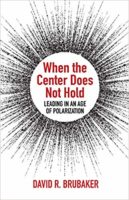Over the 27 years that I’ve consulted with congregations and other organizations, I’ve noticed three consistent traits of effective congregational and organizational leaders—whether lay or ordained. These traits are present with such consistency I’ve come to believe that together they constitute a required set of core characteristics of effective leaders. Fortunately, these traits can be developed by any congregational or organizational leader—as highly effective leaders are made, not born.
Effective leaders lead out of a clear set of core values and personal principles. This grounding trait is well established in the leadership literature, and is also borne out by my own experience. Effective leaders know who they are, what they believe, and where they stand. They are quite willing to negotiate, but they do so from a clear sense of their own core values.
Ineffective leaders find themselves at one end or the other of a continuum. Either they take uncompromising stands (“you’re either for me or against me”) or they waffle with the winds of discord in the congregation. Effective leaders, by contrast, are crystal- clear about the values that drive their decision-making. They are willing to listen deeply and to consider multiple perspectives. Ultimately, however, they make decisions not on the basis of popular opinion but on the foundation of their own deepest convictions—albeit in consultation with others.
Effective leaders understand that genuine leadership requires a team. Every highly effective leader I have known led as part of a team rather than as a lone ranger. A senior pastor works closely with her key staff and elders to provide leadership for the congregation. A university president meets regularly with his cabinet to provide direction for the university. A CEO of a major health care facility relies on her vice presidents to both to manage core functions and to advise her in major decisions. I have yet to meet an effective leader who crooned “I did it my way!” when reflecting on his or her leadership career.
Leadership can be lonely, and even isolating. But that’s precisely why effective leaders invest so much time in building a capable team and encouraging them to give honest feedback and express clear disagreement. To be an effective “team player” does not mean that one always “goes along.” Rather, effective leaders hire people they know to be highly capable and then invite them to speak their truth without fear of retribution. The opposite approach produces a Nixonian White House or an Enronian meltdown.
Effective leaders combine an iron will for the organization with a deep personal humility. This was the essential finding of Collins (2001) research in Good to Great. What Collins and his team discovered was that the 11 highly successful leaders they interviewed all combined a “fierce professional will” with a “deep personal humility.” This meant that the leaders possessed a fierce resolve when it came to what was best for the organization they led, rather than for their own careers or reputations. At the same time, they were loath to take credit for the accomplishments of the organization and tended to “look out the window” to give credit to their colleagues in the organization or even to a propitious environment.
In my view, the “fierce professional will” of these highly effective leaders came in large measure from their clear personal values. Every highly effective leader I’ve come to know well has stressed the value they place on developing the people within their organization, which is the most important form of organizational development. Leaders who are focused only on their own careers and accomplishments tend to leave resentment and suspicion in their wake—the very opposite of the trust that is a crucial currency for effective organizational leaders.
How do we develop such leaders?
By now you I hope you can affirm my description of effective leaders as operating out of clear values, committed to working as part of a team, and possessing a fierce will along with personal humility. But if you agree that such leaders are made rather than born, how do we go about producing them? Here are three recommendations for developing effective leaders in our congregations and other faith-based organizations.
- Stress Values, Not Just Skills. Leadership skills are important, including the ability to cast a vision, mobilize people, and organize tasks. But even more important are the values that undergird effective leadership—such as respect for the dignity of all human beings and a commitment to empowerment. Every time I teach a course on “Leadership for Healthy Organizations” I begin with a values clarification exercise designed to encourage aspiring and current leaders to become very clear about their core values and how those values drive their behavior as leaders. We know our values are real when they have real behavioral implications—when our espoused values become our lived norms.
- Learn to Coach a Team Rather than Run Solo. Congregational and organizational leaders are often expected to “do for” others in the congregation or organization. Congregational members, in particular, tend to expect the “paid staff” to care for the operations and ministry of the congregation. But as with the response to the grumbling Greek-speakers in the early Christian church, wise leaders learn to do what the apostles did. They listen carefully to the complaints, agree on a response to the problem, and then invite the grumblers to take the lead in solving the problem. There’s little doubt that coaching a team takes longer than acting unilaterally—but it also leads to much greater ownership and thus more durable solutions.
- Keep Things in Perspective. The surest route to ineffective leadership is to take everything personally. A defensive, reactive leader destroys trust and makes would-be followers conclude that “it’s all about him or her.” As one who is tempted to take both success and failure too personally, I need to regularly remind myself that there are multiple variables that produce an outcome–and that the only one over which I have significant control is my own behavior. A “deep personal humility” does not mean an attitude of self-debasement. Rather, it reflects a realistic understanding of one’s strength and weaknesses, combined with a willingness to trust God and one’s team for the outcomes—rather than relying solely on one’s own strengths. And a “fierce professional will” denotes a commitment to something larger than oneself—a passionate devotion to what is best for the congregation or organization as a whole.
So how do we as leaders learn to stress values, coach a team, and keep things in perspective?
In my own experience, the presence of two key mentors (one in my 20s and one in my 30s) who modeled these behaviors was my most effective education in leadership. Most of us learn to be better leaders by reflecting on our own leadership experiences and by observing leaders whom we respect. In the first half of our careers we all need leadership mentors, and in the second half of our careers many of us need to become mentors to younger leaders. Since all of us want better leadership for our congregations and other organizations, we can begin by committing to strengthen our mentorship.
David Brubaker has consulted with organizations and congregations in the U.S. and a dozen other countries on organizational development and conflict transformation. He is the author of Promise and Peril, on managing change and conflict in congregations, and When the Center Does Not Hold, on leading in an age of polarization. David recently retired from his role as Dean of the School of Social Sciences and Professions at Eastern Mennonite University, and is now a Professor Emeritus of Organizational Studies.


